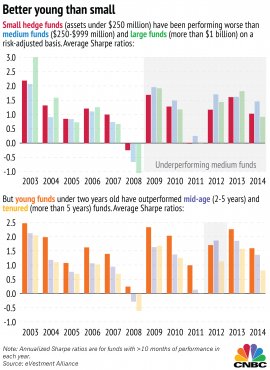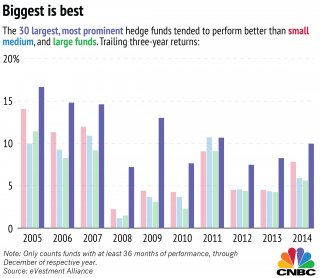
 Adam Jeffery | CNBC
Adam Jeffery | CNBC
Trader on the floor of the New York Stock Exchange.
You've probably heard the conventional wisdom: Smaller, younger hedge funds are more nimble, and tend to bring better returns than their bulky, aging cousins.
But youth and size are not the same thing. About 85 percent of young funds—under 2 years old—manage less than $250 million in assets, but only about 14 percent of all small funds are young. That's down from 42 percent of all small funds about a decade ago.
That may sound like simple semantics, but it matters because "young" funds and "small" funds don't behave the same when it comes to returns. While young funds do, in fact, tend to outperform older funds, small funds haven't been doing as well in recent years.
Looking at Sharpe ratios, a measure of risk-adjusted return, small hedge funds have been underperforming medium-sized funds for the last six years, a stark difference from strong returns before the financial downturn, according to an analysis of thousands of reporting funds by eVestment Alternatives Research.
"Everyone thinks that small funds perform well, but we see that disappearing over time, " said Peter Laurelli, vice president of research at eVestment.
What changed? Both the market environment and the strategy composition of the different categories shifted over that time, said Laurelli. Most of the early outperformance from the smaller funds came from emerging market strategies, where smaller funds were more likely to be focused on specific countries and to operate in more volatile environments. Later, small funds also outperformed in managed futures and macro strategies, he said.
 "The post-financial crisis environment has seen each of these groups go through periods of difficulty, driven by their respective market environments, " said Laurelli.
"The post-financial crisis environment has seen each of these groups go through periods of difficulty, driven by their respective market environments, " said Laurelli.
Read MoreDelivering Alpha ideas move these stocks
Investors seem to be catching on. The proportion of small hedge funds has been falling, and investors seem to be favoring medium and large funds. New funds also tend to be larger, with the percentage of young funds that are medium-sized growing from less than 8 percent before the financial crisis to about 13 percent in 2013.
As for young hedge funds, they tend to have healthy returns because by definition they have a timing advantage—funds tend to be formed at times that are advantageous for their specific strategies. For example, a crop of successful securitized credit strategy funds was founded after the recession in response to opportunities in that area, and while all types of funds saw good returns for that type of strategy at that time, those returns will raise the "young fund" category because they were created at that time.
The biggest funds are big for a reason
The 30 largest, most prominent hedge funds at the end of 2014 performed better than any group aside from the average young fund. Last year, those funds returned a little more than 6 percent—missing the young funds by just 5 basis points.
The biggest funds together manage nearly $450 billion, yet was one of the only groups—again, along with young funds—to end in the black in 2011. Even in 2008, the largest funds limited their losses to an average of 0.65 percent, despite the added difficulty of moving their much larger investments.
About 10 of those 30 largest funds use macro or managed futures strategies, that led to healthy returns around the time of the financial crisis. Eight used credit strategies, which were strong after the crisis. Others were multistrategy or distressed and special situation investing, said Laurelli. Few are pure equity products, so the losses of 2008 and 2011 harmed the largest group the least.
And of course, big funds don't usually get big by being bad at what they do.
"Prominent funds become prominent because their performance warrants growth of assets, " said Laurelli. "Performance is a mix of opportunity, the ability to attract and pay the talent to exploit opportunity, and the scale needed to profitably exploit opportunities."
Return isn't everything
While some small funds have struggled to raise capital and gone bust, some have had solid returns and will continue to attract interest, said Amy Bensted, head of hedge fund products at Preqin, an alternative assets intelligence firm.
YOU MIGHT ALSO LIKE












